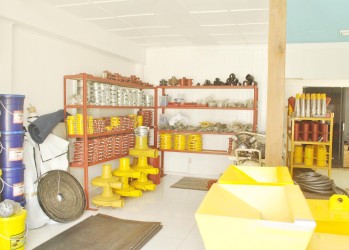Every conceivable economic activity at Port Kaituma revolves around the gold-mining industry so that it is hardly surprising that the downward spiral in the price of gold has cast a pall of gloom over the community. Not that business has dried up altogether. The bigger mining operations persist on the cushion that they had created. Many of the smaller ones, the hustlers—at least most of them—have packed up and gone. So have the miners from Brazil and Venezuela who had persisted because there was no way of keeping them out. Port Kaituma’s economy also found room for women who sold themselves. That market, too, has dried up.

The residents of the community say that two years ago Port Kaituma was a far cry from what it is now.
When Stabroek Business visited the township last week we spoke with a range of businesspeople: fruit vendors, taxi drivers, mechanics and a hotel owner. All of them operate businesses that revolve around the fortunes of the gold mining industry. Each, in turn, has a disconsolate tale to tell. The fruit vendors and grocers rely on the patronage of the small miners. The wealthier miners fetch their supplies in from Georgetown. The pressure associated with the drop in the price of gold hit the small miners first and for the vendors offering fruit and vegetables on the waterfront and elsewhere in the township patronage is down.
Small business operators from coastal Guyana who had found their way into Port Kaituma to take advantage of the ‘gold rush’ are now in a state of indecision. One of the vendors, Carol Clarke, who used to vend fruit and vegetables outside Stabroek Market moved to Port Kaituma since 2009. She currently operates at the waterfront. She buys her fruit and vegetables from boats that bring produce from Seabi, a farming settlement situated about ten miles along the Seabi River off Port Kaituma. Clarke is one of those vendors who depended on the patronage of the small miners. With mining operations having reduced significantly she is stuck with a situation that is fraught with uncertainty.
The taxi drivers depend on patronage from residents and from the business community. Much of the travelling is linked to commercial activity and the decline has meant that transportation is not as lucrative a business as it

